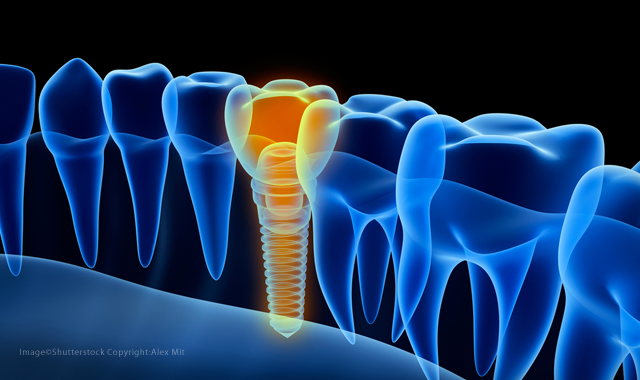New discovery could reduce the dental implant failure rate
Scientists have developed a new nanocoating that’s designed to reduce the risk of dental implant failure.

Dental implants are a common and effective tooth replacement option, which is why it's no surprise that about 3 million Americans have dental implants. That number is rising by 500,000 people each year, according to the American Academy of Implant Dentistry.
While dental implants are a great option for many patients, a major issue is the implant failure rate. According to a 2015 study, almost 8 percent of patients with dental implants experienced the loss of at least one implant over a 9-year period.
To combat the dental implant failure rate, scientists from the School of Biological Sciences, Peninsula Schools of Medicine and Dentistry and the School of Engineering at the University of Plymouth have developed a new nanocoating for dental implants that’s designed to reduce the risk of peri-implantitis. Peri-implantitis is a localized lesion involving bone loss around an osseointegrated implant. It has been identified as the main reason for dental implant failure.
In the study, the scientists evaluated the effectiveness of nanocoatings. Titanium alloy implants were surface modified to create a combination of silver, titanium dioxide and hydroxyapatite (HA) nanocoatings. Their antibacterial performance was assessed by measuring the growth of a proportion of live/dead cells and lactate production by microbes over a 24-hour period.
The results of the study showed that the application of a dual-layered silver-HA nanocating to the surface of implants successfully inhibited bacterial growth and the formation of bacterial biofilm on the implant surfaces was reduced by 97.5 percent. Uncoated controls and titanium dioxide nanocoatings showed no bacterial effect.
Based on the results, the researchers concluded that applying a dual-layered silver-HA nanocoating to titanium alloy implants creates a surface with antibiofilm properties without compromising the HA biocompatibility required for successful osseointegration and accelerated bone healing.
“In this cross-faculty study, we have identified the means to protect dental implants against the most common cause of their failure,” says professor Christopher Tredwin, head of Plymouth University Peninsula School of Dentistry. “The potential of our work for increased patient comfort and satisfaction and reduced costs is great and we look forward to translating our findings into clinical practice.”
The study, titled “Antibacterial activity and biofilm inhibition by surface modified titanium alloy medical implants following application of silver, titanium dioxide and hydroxyapatite nanocoatings,” was published in Nanotoxicology.